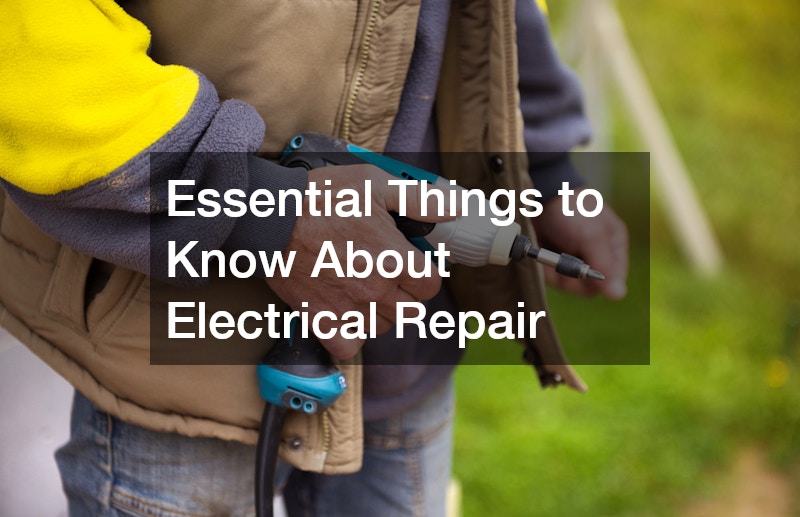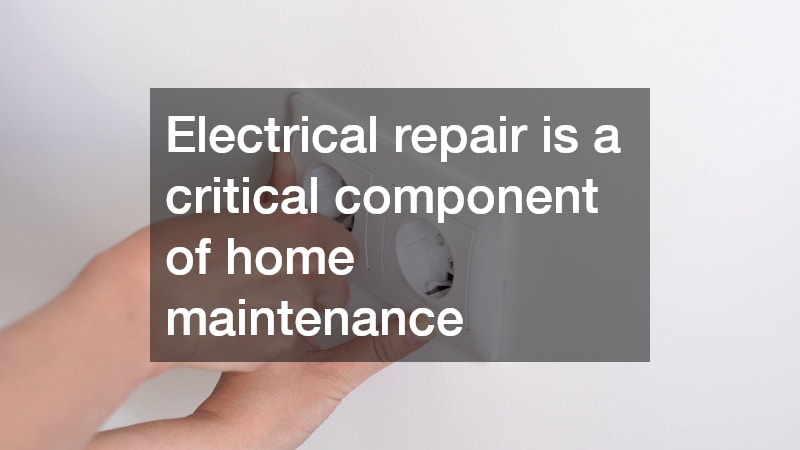Essential Things to Know About Electrical Repair

Electrical repair is an essential aspect of home maintenance, ensuring that your electrical systems run smoothly and safely. Whether you’re dealing with a flickering light, a malfunctioning outlet, or planning to upgrade your home’s wiring, understanding the basics of electrical repair can save you time and money. Electrical issues, if left unchecked, can lead to serious safety hazards such as electrical fires, shocks, or even damage to your home’s appliances and infrastructure. This guide will provide you with valuable information to help you navigate the complexities of electrical repair.
It will cover common problems, recommended tools, and important safety tips. Whether you’re a novice or have some experience under your belt, this article aims to equip you with essential knowledge to handle electrical issues effectively and safely. With a better understanding of how your electrical system functions, you can make more informed decisions about when to tackle a repair yourself and when to call in a licensed professional.
Understanding the Basics of Electrical Systems
Before diving into repairs, it’s crucial to familiarize yourself with the basics of electrical systems. Electrical systems in a house are composed of circuits that deliver power to various fixtures and outlets. Each circuit is protected by a circuit breaker designed to prevent excess current from damaging wiring. These breakers are housed in the main electrical panel, which serves as the control center for distributing electricity throughout your home. Understanding this system allows you to identify where potential problems might lie. For example, if an appliance isn’t working, the issue could be as simple as a tripped breaker, which can be reset with a quick switch. However, if the breaker continues to trip repeatedly, it could indicate a more serious underlying issue, such as an overloaded circuit or a short. Familiarizing yourself with the layout of your electrical panel, labeling each breaker, and learning how to safely operate it are fundamental steps. This knowledge can not only help you troubleshoot problems more efficiently but also improve your overall safety when performing minor electrical repairs.
The Importance of Safety Precautions
Safety should always be your top priority when dealing with electrical repairs. It’s essential to turn off power at the circuit breaker before attempting any repair work, and to double-check that the power is indeed off using a voltage tester. Electrical work, if not done correctly, can lead to severe injuries or even fatalities, so extra caution and preparation are necessary. Avoid working in wet or damp conditions, as moisture greatly increases the risk of electrical shock. Furthermore, using insulated tools and wearing appropriate protective gear, such as gloves and goggles, can add an additional layer of safety. Keep your workspace clean and well-lit to prevent accidents and ensure you can see what you’re doing. It’s also a good idea to have a first aid kit nearby in case of emergencies. Make sure you fully understand the task at hand before beginning, and never rush the process. Remember, when in doubt, it’s always safer to call a professional who has the training and expertise to handle electrical work properly and efficiently.
Essential Tools Needed for Electrical Repair
Having the right tools is crucial for electrical repair tasks. Some of the must-have tools include a voltage tester, wire strippers, pliers, and screwdrivers. A multimeter can also be incredibly useful for diagnosing electrical problems, allowing you to measure voltage, current, and resistance. By equipping yourself with these tools, you can handle a variety of electrical fixes safely and efficiently. Investing in quality tools will not only make the job easier but also contribute to more professional results.
When to Call a Professional Electrician
While many electrical repairs can be handled by a knowledgeable homeowner, certain projects require the expertise of a professional electrician. Complex issues like wiring updates, major appliance installations, and service panel upgrades should be left to certified electricians. Attempting to tackle these without proper knowledge and experience can lead to disastrous results, including electrical fires or severe injury. Knowing when to call in a professional is paramount to maintaining your home’s safety and electrical integrity.
Common Electrical Repair Issues and Solutions
Some common electrical repair issues include flickering lights, dead outlets, and tripped breakers. Flickering lights often indicate a loose bulb or faulty wiring, and tightening the bulb or checking the wiring can solve the issue. A dead outlet can be due to a tripped outlet or faulty wiring; resetting the outlet or contacting an electrician might be necessary. Tripped breakers usually happen when a circuit is overloaded—redistributing appliances to different circuits can resolve this. It’s important to regularly assess your electrical systems to catch and fix these common issues early on.
Electrical repair is a critical component of home maintenance that helps ensure the safety and functionality of your home’s electrical systems. By understanding the basics, taking necessary safety precautions, having the right tools, and knowing when to call a professional, you can effectively manage many common electrical issues. While it’s empowering to handle minor repairs on your own, never hesitate to reach out to professionals for complex electrical work. With these essential tips in mind, you’ll be better prepared to tackle electrical repairs and maintain a safe and efficient home.
.

 3 Warning Signs Your Windows Need Replaced
3 Warning Signs Your Windows Need Replaced  Dealing with Major Roofing and Water Damage Issues
Dealing with Major Roofing and Water Damage Issues  How to Choose the Right Home Remodeling Services for Your Project
How to Choose the Right Home Remodeling Services for Your Project  10 Ways Remodeling Improves Energy Efficiency and Comfort
10 Ways Remodeling Improves Energy Efficiency and Comfort  Most Common Causes of Roof Repair
Most Common Causes of Roof Repair  Affordable Skylight Services to Brighten Your Home Naturally
Affordable Skylight Services to Brighten Your Home Naturally  Balancing DIY Projects With Professional Help
Balancing DIY Projects With Professional Help  5 High Ceiling Accent Wall Ideas for a Modern Minimalist Living Room
5 High Ceiling Accent Wall Ideas for a Modern Minimalist Living Room